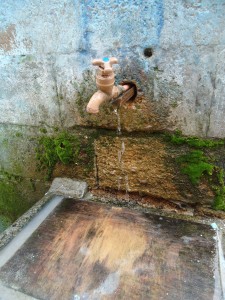Lucy successfully completed her MA degree in the Resource Management and Environmental Studies Program at the Institute for Resources, Environment and Sustainability. Lucy did her MA with Dr. Leila Harris, working on water governance and the human right to water in South Africa. Lucy’s Masters research investigated the lived everyday experiences of residents of informal settlements in Cape Town with water access and policies that realize the human right to water. Her thesis is publicly available online HERE.
Thesis abstract: South Africa has been undergoing significant changes over the past three decades with the dismantlement of the apartheid state, followed by a series of socio-political and economic changes. The structural transformation of the new democratic South Africa has been accompanied by many progressive developments for which the country has been widely praised – but also critiqued. Major elements of this transformation have been improving service delivery for formerly marginalized populations and redressing structural historical inequalities. The main goal of this work is to investigate how these changes affect on-the-ground realities in areas of Cape Town, South Africa, by focusing on the micro level, namely on communities and individuals in marginalized urban areas. This manuscript-based thesis is founded on Master’s research conducted in 2012, with a follow up in 2013, in Site C, Khayelitsha, a partly informal township in Cape Town, South Africa. It investigates the conditions of water access in Site C, the different meanings people attach to water access as well as associated implications for experiences of the human right to water and citizenship more broadly. Chapter 2 analyzes the ways in which the post-apartheid state is encountered in Site C through access to services, and water in particular. It traces the significance of service delivery to previously marginalized populations, such as informal settlements and black townships, as foundational in defining the relationships these populations have with the post-apartheid state. This chapter concludes that these relationships vary significantly along the lines of formality, whereby the housing formalization process contributes to the marginalization of shack dwellers. Chapter 3 focuses more specifically on the human right to water, for which South Africa has been widely praised in both academic and policy realms. This chapter adopts a “lived notions of rights” conceptualization and draws attention to the material conditions as well as the emotive and discursive meanings of water access for residents of Site C. This thesis contributes to a more nuanced understanding of the everyday lived dimensions of relative marginalization, proceeding alongside the housing formalization process in Cape Town and South Africa as a whole.
Lucy is now beginning her PhD at IRES. Her future research interests involve issues around water access and resilience of vulnerable urban populations under climate change. Good luck!

